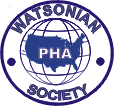Watsonian Society
An
Organization for Public Health Advisors
| skip
menu Bylaws & Constitution |
| Committees |
| Community Service |
| Events |
| Help Wanted |
| History |
| Membership |
| Mentorship |
| Mission |
| Newsletter |
| Officers |
| Join Watsonian |
| Contact Us |
| History -
Tales from Today's PHAs
Becoming a PHA I recently began my career with CDC in the inaugural Public Heath Apprentice class that started in Florida in July 2007. It was a wonderful experience and I gained the skills needed to be hired as a PHA working in Washington D.C. in June 2009. About the Public Health Apprentice Program (PHAP): I enjoy being in the field and am lucky to have the opportunity to work at the local level. As I’ve heard many times, everything starts here. Every PHA I’ve talked to enjoyed their time in the field, but always remembered how tough things could get. But without those experiences they wouldn’t be in the place they are now. And, I would imagine their stories wouldn’t be as interesting either. It was wonderful to hear each of their stories and ask them questions about the experiences and about being a PHA. It provided me with even more respect for the field I had chosen to enter. About my work in the field during PHAP: Since I was already a Certified Health Education Specialist (CHES), I was able to assist with a variety of programs and planning with little direction (i.e. chronic disease, tobacco prevention, diabetes, abstinence, disaster preparedness, 2 community needs assessments, and planning a Women’s Health Fair). During my time there an interesting but unfortunate thing happened and I learned the most from my time in those counties from this event. We had a suspected case of TB in our rural community. It was a pregnant teen that used our facility for prenatal care. We didn’t have a TB team or TB nurse in place to handle case management or to conduct an investigation on the nearly 200 contacts. I had attended TB and TST training a couple of months earlier. This was my chance for some “action.” I became the "TB lady" for both counties (name given by residents). The health department was responsible for the community contact investigation and a TB nurse from Gainesville was responsible for the school. The nurse from Gainesville was the person I turned to when I had questions about our investigation, if I needed to know how to proceed or just wanted to run an idea by her, she was there. I learned a lot of skills during this time that would prove valuable. I collected patient data through conducting interviews/screenings, analyzed charts/reports, conducted field visits, developed a investigation baseline summary, educated contacts on the test, DOT and infection, placed and read skin tests, filled out consent paperwork, completed progress notes, and patients vitals. I initiated and held meetings with key TB personnel to plan for retests and highlighted planning areas of interest (i.e. clinic traffic flow, required paperwork, staffing and supplies). I trained with local staff and we created a TB team which included the administrator, director of operations, a nurse and myself. Through this experience I worked with staff from TB and STD in Gainesville and was introduced to George Gibbs and Randy Jefferson who where current PHAs with CDC assigned there. I talked to them about STD and asked a lot of questions which lead to my interest in becoming a DIS and to my second year transition. I spent my second year as a Disease Intervention Specialist (DIS) in Jacksonville Florida working with Tommy Chandler, who is a legend there, and many other local staff who were very knowledgeable. I was able to "hit the ground running" because I had attended ISTDI during my first year and had gained case management experience from working TB. One of the biggest differences from TB was that I was asking the clients more personal questions and asking about their sex lives. It surprisingly didn’t bother me. A new PHA in DC: I’m working as a DIS here, but in a unique way. I’m team lead for a School Based Screening Program. We conduct presentations and CT/GC screenings in all 20 district schools. The presentations are mandatory for all 9th-12th grade students and the screenings are optional. For those who are positive we provide treatment at the school and work the cases the same way we would if it where a syphilis case. I’m lucky to have had the chance to work for the legend or as some call him “the voice,” Mr. John Heath for a few months before he retired and heard some of his stories to store in my mental collection. It’s a different world here in DC. There are many things that stand out from the places I worked in Florida. I’m thrilled to have this opportunity and to begin my journey in a place where someone once told me, “either you make it or you don’t.” |
Click on Watsonian
logo to return to home page.
Page last updated
March 03, 2010
